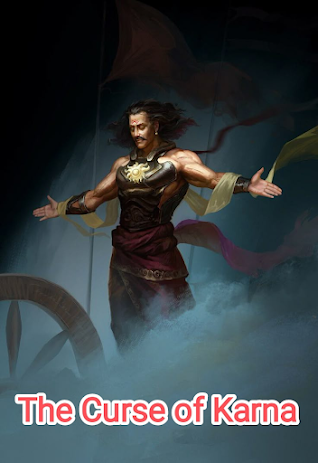T.P. Kailasama’s 'The Curse or Karna'
Hello readers,
This blog is based on a thinking exercise given by Megha Ma'am. It includes my own thoughts and opinions in response to the questions she asked.

Q] Write a critical note on the class conflict and caste conflict in 'The Curse or Karna'.
In The Curse, Karna is portrayed as a courageous and loyal warrior, admired for his strength and generosity. However, his life is heavily influenced by the unfair treatment he faces due to his low-caste background, his parentage, and being an outsider in the Kuru dynasty.
Karna’s Struggle with Caste
A key part of Karna’s story is his constant battle to rise above the label of being a "Suta-putra," the son of a charioteer. Although he is actually the son of Kunti and the Sun God, his upbringing in a lower caste makes people doubt his worth. Karna is caught between two worlds—his humble birth and his divine heritage, which he is unable to claim.
Kailasam uses this struggle to show the unfairness of the caste system. No matter how skilled or noble Karna is, he is always looked down upon because of his caste. Examples like Dronacharya refusing to teach him, Draupadi rejecting him during her swayamvara, and society’s general treatment of him demonstrate how deeply caste divisions are ingrained. In this system, being born into a higher caste is more important than one’s abilities.
Class Conflict: Karna’s Fight for Acceptance
The play also explores the issue of class conflict. Karna’s situation is contrasted with that of the Pandavas and Kauravas, who come from the ruling class. They have power, respect, and opportunities simply because of their noble birth, while Karna, despite his talents, has to continuously struggle for acceptance.
Karna’s loyalty to Duryodhana can be seen as part of this class struggle. Despite Karna’s low caste, Duryodhana values him for his abilities and sees him as an ally to challenge the Pandavas’ dominance. For Karna, this friendship gives him the recognition he’s always been denied by society. Their bond shows how people from marginalized backgrounds can join forces with those seeking power, each with their own reasons.
Kailasam uses this relationship to criticize how the class system can manipulate people. Duryodhana uses Karna for his own political purposes, but Karna remains loyal, hoping for the acceptance that has always been denied to him. Karna’s story is tragic because, although he is used by the upper class, he never receives the respect and privileges they enjoy.
Karna’s Tragic Fate: Where Caste and Class Intersect
In the end, Kailasam shows how both caste and class contribute to Karna’s tragic fate. Despite his great skills and royal heritage, Karna’s dreams are constantly thwarted by his low birth and social status. His efforts to rise above these limits through loyalty and bravery fail because society is too rigid to accept him.
Kailasam uses Karna’s personal tragedy to criticize the caste and class systems. Karna’s downfall is not due to any personal failure, but rather a society that refuses to look beyond labels of caste and class. The play highlights how these social systems harm individuals by valuing birth over true talent and potential.
Q] Is moral conflict and Hamartia there in Karna's Character?
Karna faces a deep moral struggle when Kunti, his birth mother, reveals the truth about his origins and asks him to join the Pandavas, his true brothers, in the war. Now aware that he shares their strength and blood, Karna is torn. On one hand, he has discovered his real identity and the family bond with the Pandavas. On the other hand, he has already sided with the Kauravas, their enemies. His loyalty to Duryodhana pulls him in the opposite direction. Duryodhana was the only one who treated Karna with respect and gave him a higher place in society, making Karna feel indebted to him. Karna’s dilemma is whether to fight alongside his newfound brothers or remain loyal to Duryodhana, who had always stood by him.
One of Karna’s major flaws, or "hamartia," goes back to the time when he lied to his teacher, Parshuram. Since Parshuram only taught Brahmins, Karna pretended to be one, hiding the fact that he was actually a Kshatriya. This lie led to a curse that later affected him during battle. This dishonesty is a key weakness in Karna’s character.
Another major flaw is Karna’s unwavering loyalty to Duryodhana. Even though he knew that some of Duryodhana’s actions were wrong, Karna stayed by his side, even leading the fight against Arjuna in the Kurukshetra war. His tragic end reflects Aristotle’s concept of the “flawed good man,” someone who is generally virtuous but is undone by their own mistakes. Aristotle believed true goodness comes from acting according to virtue, but in Karna’s case, his virtues are overshadowed by his flaws, leading to his downfall.


.jpg)
.jpg)
.jpg)
No comments:
Post a Comment